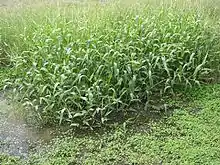Hymenachne
Hymenachne is a genus of widespread wetlands plants that is in the grass family. They are commonly known as marsh grasses.[4] They are distributed in tropical and subtropical regions of Asia, the Americas, and the Pacific Islands.[5] A species from the Americas, H. amplexicaulis, is well known in other parts of the world as an introduced and invasive species.[6]
| Hymenachne | |
|---|---|
 | |
| Hymenachne amplexicaulis | |
| Scientific classification | |
| Kingdom: | Plantae |
| Clade: | Tracheophytes |
| Clade: | Angiosperms |
| Clade: | Monocots |
| Clade: | Commelinids |
| Order: | Poales |
| Family: | Poaceae |
| Subfamily: | Panicoideae |
| Supertribe: | Andropogonodae |
| Tribe: | Paspaleae |
| Subtribe: | Otachyriinae |
| Genus: | Hymenachne P.Beauv.[1][2] |
| Synonyms[3] | |
| |
Hymenachne is similar to genus Sacciolepis. Both were formerly considered part of Panicum.[7]
Hymenachne aquatic plants frequently found in marshes and other wet habitats. Their stems are spongy with aerenchyma tissue.[7] The longest stems can reach 4 meters. They are perennial, sometimes with rhizomes. The leaves are linear or lance-shaped.[8] The inflorescence is usually a cylindrical, spike-shaped panicle, rarely with branches.[7]
Diversity
- Hymenachne amplexicaulis – West Indian marsh grass, olive hymenachne - West Indies; Latin America from Mexico to Uruguay; naturalized in Australia, parts of Asia, Florida
- Hymenachne assamica - China, Assam, Myanmar, Thailand
- Hymenachne donacifolia - Cuba, Puerto Rico, Trinidad; Latin America from Honduras to Paraguay
- Hymenachne grumosa - Paraguay, Uruguay, Brazil, Argentina
- Hymenachne patens - China (Anhui, Fujian, Jiangxi)
- Hymenachne pernambucense - Paraguay, Uruguay, Brazil, Argentina
- Hymenachne wombaliensis - Zaïre
- formerly included[9]
see Panicum Pennisetum Sacciolepis
- Hymenachne aurita - Panicum auritum
- Hymenachne boiviniana - Panicum boivinianum
- Hymenachne campestris - Sacciolepis vilvoides
- Hymenachne condensata - Panicum condensatum
- Hymenachne fluviatilis - Sacciolepis vilvoides
- Hymenachne frondescens - Panicum stoloniferum
- Hymenachne indica - Sacciolepis indica
- Hymenachne insulicola - Panicum auritum
- Hymenachne interrupta - Sacciolepis interrupta
- Hymenachne leptostachya - Panicum pulchellum
- Hymenachne montana - Pennisetum montanum
- Hymenachne myosuroides - Sacciolepis myosuroides
- Hymenachne myosurus - Sacciolepis myuros
- Hymenachne myuros - Sacciolepis myuros
- Hymenachne phalarioides - Sacciolepis indica
- Hymenachne phleiformis - Sacciolepis myuros
- Hymenachne polymorpha - Panicum auritum
- Hymenachne striata - Sacciolepis striata
References
- Palisot de Beauvois, Ambroise Marie François Joseph. 1812. Essai d'une Nouvelle Agrostographie pages 48-49 in Latin
- Palisot de Beauvois, Ambroise Marie François Joseph. 1812. Essai d'une Nouvelle Agrostographie plate X (10), figure VIII (8 a-h) at upper right; line drawings of Hymenachne sp.; figure captions on caption page 8
- Tropicos, Hymenachne P. Beauv.
- Hymenachne. Integrated Taxonomic Information System (ITIS).
- Clarkson, J. R., et al. (2011). A report of hybridisation in Hymenachne (Poaceae, Panicoideae) with description of Hymenachne × calamitosa, a new species of hybrid origin from tropical Australia. Archived 2013-09-25 at the Wayback Machine Telopea 13(1-2), 105-14.
- "Hymenachne amplexicaulis". Germplasm Resources Information Network. Agricultural Research Service, United States Department of Agriculture. Retrieved 21 January 2018.
- Hymenachne. Flora of China.
- Hymenachne. Grassbase - The World Online Grass Flora.
- Kew World Checklist of Selected Plant Families
- GRIN Species Records of Hymenachne. Germplasm Resources Information Network (GRIN)